On the opening night of The Lost Years of German Cinema: 1949–1963 at the Film Society of Lincoln Center, film historian Olaf Möller, following his introduction of Gottfried Kolditz's White Blood (Weißes Blut), joined me for a conversation on the program he curated that includes sensational work of filmmakers Helmut Käutner, Hans Heinz König, Fritz Lang, Peter Lorre, Kurt Hoffmann, Harald Braun, Wolfgang Staudte, Aleksander Ford, Konrad Petzold, and Robert Siodmak.
Earlier in the day at the Walter Reade Theater I watched Robert Siodmak's The Devil Strikes At Night (Nachts, Wenn Der Teufel Kam) and Hans Heinz König's Roses Bloom In The Moorland (Rosen Blühen Auf Dem Heidegrab). I started out with a couple of childhood television memories.
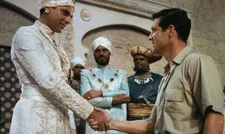 |
| Fritz Lang's The Tiger Of Eschnapur (Der Tiger Von Eschnapur) |
Anne-Katrin Titze: There are some things in your program that I haven't even thought about since I was a child.
Olaf Möller: Like?
AKT: Der Tiger Von Eschnapur [The Tiger Of Eschnapur] terrified me. I probably last saw it at the age of five. Isn't there a scene with lepers?
OM: Yep. They look very scary.
AKT: They were haunting my dreams. The other film is Das Spukschloss …
OM: Das Spukschloss Im Spessart [The Haunted Castle]! Which is fantastic. Great musical! It's a horror musical.
AKT: A German horror musical.
OM: Yeah. Basically, it's all singing, all dancing.
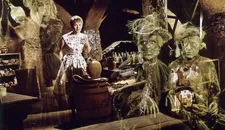 |
| Kurt Hoffmann's The Haunted Castle (Das Spukschloss Im Spessart) |
AKT: Lilo Pulver!
OM: And lots of little ghosts and lots of naughty comments about post-war German politics and stuff like that. Actually much better than the first Spessart film and definitely far superior to Kurt Hoffmann's Wir Wunderkinder. That's a pernicious piece of shit, that film. That's really evil. This one is much much more interesting.
AKT: I just spent the afternoon watching [Robert] Siodmak's The Devil Strikes At Night and [Hans Heinz] König's Roses Bloom In The Moorland. I was blown away by both. Let's start with the Siodmak and its reception. Is it well known in Germany?
OM: Well, it's one of a few films of that period that people would probably remember, at least by way of title. The title Nachts Wenn Der Teufel Kam is quite well known, let's put it like that. I mean, it's mainly known because of Mario Adorf who plays the serial killer who actually probably wasn't a serial killer in real life.
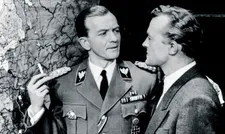 |
| Robert Siodmak's The Devil Strikes At Night (Nachts, Wenn Der Teufel Kam) |
Actually I met Adorf in Locarno and asked whether he was actually aware back then that he was most probably playing a complete falsification of history. And he said yes. He was quite aware of that. The film is really interesting in historical terms.
AKT: The part about euthanasia? Which historical terms do you mean?
OM: The guy who plays the good cop in the film, the character of the good cop, is most probably, historically speaking, really a monumental monster. In so far that it is quite possible that he actually invented the whole story. In the sense that he came up with this whole idea of a serial killer to basically clean the slate.
But already back then there were people doubting whether this guy really was a serial killer. Already a lot of people then were saying no, Bruno Luedke is not a serial killer, all of this is nonsense. This is really a big, big fabrication. But this fabrication for the post-war culture was very useful.
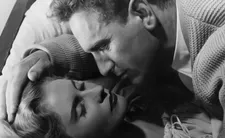 |
| Hans Heinz König's Roses Bloom On The Moorland (Rosen Blühen Auf Dem Heidegrab) |
The film is based on a nonfiction novel by Will Berthold, who was really the master of historical twisting. And his narrative offered a good way to talk about something that Germans really liked to talk about at the time. The difference between, let's say, the Nazi apparatus, and the civilian apparatus.
So what we have here is the good civilian who is basically trying to come up with an idea of order, and the Nazis who are abusing it. So in that regard the film is very typical of its period and you might say also in the way that in this period historical narratives were given a certain spin.
AKT: The Rossdorf character [the SS-Gruppenführer played by Hannes Messemer] is very charming, though.
OM: Yes, of course. But that doesn't help with the way that things play out, so to speak. The Nazis, the SS, were the usual evil Nazis. The SS is being shown as a bunch of psychos who then start to threaten the civilian apparatus, meaning our police guy [Axel Kersten]. And the police guy actually gets sent to the front which is probably the nightmare of every German man at that point in time. It's a useful narrative at that period. Even if it's historically probably extremely inaccurate.
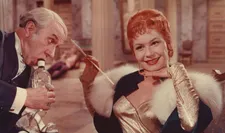 |
| Konrad Petzold's The Dress (Das Kleid) |
But what also makes the film quite interesting is that you do have a director, who has really a background in Hollywood noir filmmaking, doing noir in West Germany. This is something that people very much appreciated.
The film does have a somewhat different drive and edge than West-German films at that point in time had. I like the film for its aesthetics, maybe not necessarily for the story it tells. It's interesting that it's actually a re-migrant who would also basically make himself common with this historical falsification.
AKT: The episode about the hidden Jewish woman seemed very strangely placed in the middle. It seemed to function almost like a wart in the film.
OM: Yes. There are quite a lot of warts in that film. I mean the character of Bruno Luedke as such is a wart. I mean, that's basically the thing that makes this whole period so interesting. You do have, let's say, the main narrative, and then you have lots of things going on below the surface, slightly out of frame, etc. So it's basically a cinema that is usually full of contradictions.
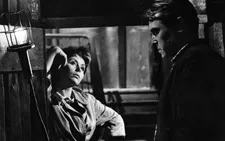 |
| Aleksander Ford's The Eighth Day Of The Week (Ósmy Dzień Tygodnia) |
AKT: The women characters are fascinating - the woman here [Helga played by Annemarie Düringer] and especially the women in Roses Bloom In The Moorland. They were not really shown competing with each other, unlike the ones in Black Gravel. They seemed to be different facets of one - the main woman, the mad woman, the maid, the good mother.
OM: The film is very much a mental landscape. Then again, this film is from '52 and Schwarzer Kies [Black Gravel] is from '61. The country changes so much in that period. It's not surprising that the inner landscapes - and both films really are vast interior landscapes of the Federal Republic - that these interior landscapes very much change. And that also the image of women changes very much in that period.
AKT: The dreaminess, the ghostliness in the Moorland film - it felt as if they were sleepwalking.
OM: Yes. It's a film about a curse. It's basically people being possessed by the past. People are led by the past through their destinies. Yeah, we are in the early stage of the Federal Republic of Germany. This is a period when destiny is very much on the menu of the movies. It's interesting that basically from '49 till roughly '51, '52, quite a lot of, let's say, horror movies were made, movies about people being doomed. Or about destiny striking. And this really vanishes.
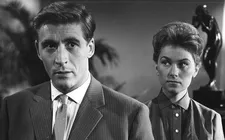 |
| Gottfried Kolditz's White Blood (Weißes Blut) |
AKT: When, would you say destiny vanishes?
OM: Around '53. The question of destiny is then dealt with. When you come to '61 we are already in the period of free choice, so to speak. The war trauma is another ten years away. People have gotten rich, life has gotten normal. As normal as it will ever get. So of course people see the question of fate and destiny quite differently.
AKT: Do you see a link during the destiny phase with earlier films? I am thinking of Veit Harlan and Goldene Stadt, the moorland …
OM: The moorland is not so much in Goldene Stadt as In Die Reise Nach Tilsit.
AKT: But isn't there also an ancestor's grave, the moor, a curse?
OM: Yeah, I mean, of course this whole destiny thing, yeah. It's melodrama. Melodrama had a lot to do with destiny, and horror movies have a lot to do with destiny but Harlan is also very much Harlan. He's a very unique figure. He was probably the great singer of the question of destiny and doom.
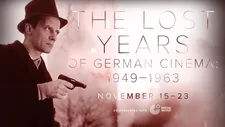 |
| The Lost Years of German Cinema: 1949–1963 at the Film Society of Lincoln Center |
AKT: That's why I thought of him.
OM: I mean, let's leave Veit for once out of it. I mean, I had been thinking about having actually a Harlan film in the program in Locarno. Verrat An Deutschland (Der Fall Richard [Dr.] Sorge) which I find a really fascinating film to say the least. I'm a big fan of Harlan. But Harlan's fascination with destiny is something I think quite personal. Other great German directors also of the Nazi period do not necessarily share that. So it's really more his thing.
Coming up - Olaf Möller on the films of Helmut Käutner and self-censorship, Wolfgang Staudte, Harald Braun, and "I don't like digital. I like analog."
The Lost Years of German Cinema: 1949–1963 is organised by Dennis Lim and Dan Sullivan of the Film Society of Lincoln Center, and co-presented with the Goethe-Institut. The films selected are from the retrospective curated by Olaf Möller and Roberto Turigliatto at the 2016 Locarno Film Festival, organized in partnership with the Deutsches Filminstitut, in collaboration with the Cinémathèque suisse and German Films.
Film Society of Lincoln Center Walter Reade Theater remaining screenings:
Redhead (Die Rote) - Saturday, November 18 at 4:30pm
The Tiger Of Eschnapur (Der Tiger Von Eschnapur) - Saturday, November 18 at 6:30pm
The Haunted Castle (Das Spukschloß Im Spessart) - Saturday, November 18 at 8:45pm
Black Gravel (Schwarzer Kies) - Sunday, November 19 at 6:00pm; Thursday, November 23 at 6:00pm
The Dress (Das Kleid) - Sunday, November 19 at 2:00pm; Tuesday, November 21 at 7:00pm
The Eighth Day Of The Week (Ósmy Dzien Tygodnia) - Sunday, November 19 at 4:00pm; Tuesday, November 21 at 9:00pm
The Devil Strikes At Night (Nachts, Wenn Der Teufel Kam) - Sunday, November 19 at 8:30pm
The Glass Tower (Der Gläserne Turm) - Tuesday, November 21 at 4:30pm
The Lost One (Der Verlorene) - Wednesday, November 22 at 9:00pm; Thursday, November 23 at 1:30pm
Roses Bloom On The Moorland (Rosen Blühen Auf Dem Heidegrab) - Wednesday, November 22 at 7:00pm; Thursday, November 23 at 8:30pm
Sky Without Stars (Himmel Ohne Sterne) - Wednesday, November 22 at 4:30pm; Thursday, November 23 at 3:30pm
White Blood (Weißes Blut) - Tuesday, November 21 at 2:00pm
The Lost Years of German Cinema: 1949–1963 runs through November 23.








![Olaf Möller in front of Katharine Hepburn posters for Christopher Strong and Spitfire: "Das Spukschloss im Spessart [The Haunted Castle]! Which is fantastic. Great musical! It's a horror musical."](/images/newsite/Olaf Moller_600.webp)













